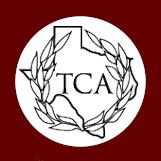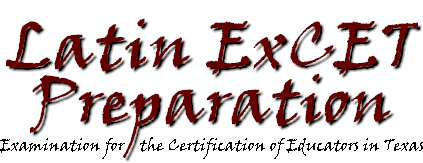 |
 |
||||||||||||||||
|
Email
Responses
The following are some comments people who have taken the Latin ExCET or have experience with the exam have sent via email. To some extent, of course, these responses need to be taken cum grano salis. Memories of exams are not always accurate, and you will note that some of the responses contradict others. Nevertheless, the responses may give you some useful impressions of the exam. I. The most important thing to emphasize is the ability to read Latin. Anyone
who can read Cicero (orations & essays) should have few problems. II. The one thing I still remember very clearly is the sheer amount of readings
in the text. My classes as an undergraduate, if I remember correctly, averaged 60-100
lines of text a night. It seemed like five times that all in one test! III. Prose: Caesar, Cicero, Sallust, Pliny the Younger IV. The best advice I got was in general test-taking skills and psyching out the
answers. Someone told me not to attempt to actually read the difficult passages but to
read the questions first to see what kind of information was required. This saved much
time and energy. V. I have before me the 2nd, 3rd, and 4th year of Jenney's Latin, the 1984 edition. I believe that the literary selections from this text series will more than adequately prepare a student for the ExCET. From Charles Jenney's Second Year Latin :
From Jenney's Third Year Latin:
From Jenney's Fourth Year Latin:
(These are not presented in numerical order in Jenney) Meter is important. Be able to
tell (multiple choice) how many dactyls a given line of hexameter has and where the
caesura falls. For Catullus and Horace be able to identify the most important lyric meters
(hendecasyllabic, Sapphic, elegaic couplet-- I think that's plenty). VI. As far as the history is concerned, I would recommend knowing details about the distant areas in the Roman Empire. But, of course, is it really worth one's time to study in such detail? I would suggest that if someone has the time, and really wants to achieve a score in the upper percentile range, then it would be worth it. Otherwise, it is possible to pass the test reviewing more general information. VII. I took the exam several years ago. My advice to examinees is to be prepared to translate a large amount of text in a short amount of time. There are only three or four questions about each relatively long passage, so examinees also need to be able to skim passages for key words. VIII. I found that most passages were from the major authors that are most often
read in typical upper level high school classes: Vergil, Horace, Catullus, Caesar, Cicero,
and Pliny (his letter about the eruption of Vesuvius, as I recall). IX. Vergil, Horace, Cicero, Caesar--these authors I remember, specifically, I
know you don't want the passages, but Aeneid, the underworld, the carpe diem poem, and
Caesar on the Druids I think I remember (but it has been 6 years) X. The sheer volume of the reading might intimidate many, as there are many passages in Latin, and the temptation to carefully read each section might be there. I suggest reading quickly for meaning, and going back to answer with care the questions, in order to conserve energy and fortitude. XI. There were three questions onthe use of "nonne" and "num". I thought that was a lot for a minor point. There wasn't one on passive paraphrastic with dative of agent--or if there was I missed it and I was looking because that is one I often forget if I am not thinking. Lot of pronoun questions--reflexive or regular. Some Unus Nauta words in genitive and dative. They did have several questions on what kind of clause something was--purpose, etc, and what kind of ablative--agent, etc. XII. For some strange reason, there were no scansion questions on the exam--not one! Those things aside, everything else was very similar to what was in the practice tests. Many authors appeared on the test, including Vergil, Cicero, Horace, and Catullus, among others. I found the most difficult part of the exam to be the section where you have to pick the sentence (in Latin) that best expresses the main idea of a given passage (also in Latin). This section actually appeared at the beginning of the test. To do well here, one must read lots of Latin before the exam. No short cut! |
||||||||||||||||
|
|
|||||||||||||||||
|
Latin ExCET Home Page | Main Menu | TCA Home Page Last Updated June 20, 2002. This site was re-created September 1998 by Ginny Lindzey, Webmistress, Texas Classical Association. To report problems please contact Ginny at ginlindzey@lindzey.us |
||||||||||||||||
